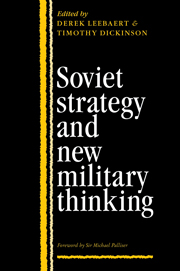1 - The stakes of power
Published online by Cambridge University Press: 03 February 2010
Summary
A classic mark of a state's greatness is that one fears it when it is strong and weak alike. The disintegration of the Warsaw Pact and the collapse of the Soviet economy have undercut familiar military reckonings of the cold war. But new menaces emerge. The world remains Herman Kahn's “dangerous neighborhood” despite summit declarations of a “qualitatively new relationship” between the superpowers.
The US and the Soviet Union are metamorphosing at biological speed rather than at the geological rates of most such political correlations. The US is moving back into the rich, benevolent island far out to sea that it traditionally longed to be. The Soviet Union is becoming an undoubted nuclear stockpile around which people anxiously seek to discern a more or less legitimate government. It is still a formidable military power with global security interests, the more pressing because they are less easy to defend.
How does Moscow imagine its strategic capacities amid the clamor about “new phases” in international cooperation? Now that the Chairman of the US Joint Chiefs of Staff describes the Soviet Union as a “business competitor” rather than an enemy, what do the leading US experts on the Soviet military predict? Where are changes in direct relationships and in their fundamental resources – wealth, knowledge, authority, will – taking East/West relations? Such sweeping issues are best organized at the hands of a group of long-time scholars of Soviet strength and vulnerability, each focusing on a central area of military expertise.
“There is no such thing as an expert on Russia,” observed US Ambassador Charles “Chip” Bohlen, “only various degrees of ignorance.”
- Type
- Chapter
- Information
- Soviet Strategy and the New Military Thinking , pp. 1 - 26Publisher: Cambridge University PressPrint publication year: 1991



